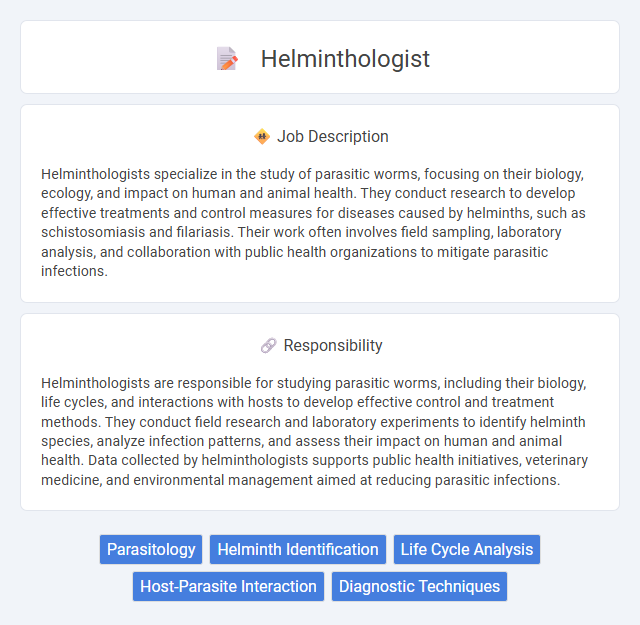
Helminthologists specialize in the study of parasitic worms, focusing on their biology, ecology, and impact on human and animal health. They conduct research to develop effective treatments and control measures for diseases caused by helminths, such as schistosomiasis and filariasis. Their work often involves field sampling, laboratory analysis, and collaboration with public health organizations to mitigate parasitic infections.
Individuals with a strong interest in biology and a fascination with parasitic worms may find a career as a helminthologist suitable. The job likely demands patience, analytical skills, and comfort working in laboratory and field environments, which may not appeal to everyone. People who prefer hands-on scientific research and the study of disease-causing organisms might be well-suited for this specialized role.
Qualification
A Helminthologist typically requires a minimum of a bachelor's degree in biology, zoology, or a related field, with advanced positions often demanding a master's or Ph.D. specializing in parasitology or helminthology. Extensive knowledge of helminth anatomy, life cycles, and host interactions is essential, alongside proficiency in laboratory techniques and microscopy. Research experience, strong analytical skills, and familiarity with molecular biology methods enhance qualifications for careers in academic, clinical, or environmental helminthology.
Responsibility
Helminthologists are responsible for studying parasitic worms, including their biology, life cycles, and interactions with hosts to develop effective control and treatment methods. They conduct field research and laboratory experiments to identify helminth species, analyze infection patterns, and assess their impact on human and animal health. Data collected by helminthologists supports public health initiatives, veterinary medicine, and environmental management aimed at reducing parasitic infections.
Benefit
Working as a helminthologist may offer significant benefits, including the opportunity to contribute to controlling parasitic worm infections that impact human and animal health. There is a probability of engaging in interdisciplinary research that advances veterinary science, agriculture, and public health sectors. The profession might provide career stability and potential for growth due to increasing demand for expertise in parasite management and disease prevention.
Challenge
Helminthologists likely encounter significant challenges in identifying and studying parasitic worms due to their complex life cycles and adaptations. They probably face difficulties in controlling parasitic infections that impact both human health and agriculture globally. The high variability and resilience of helminths might require advanced research techniques and continuous innovation to manage their effects effectively.
Career Advancement
Helminthologists specializing in parasitic worm research can advance their careers by pursuing roles in academia, government agencies, or pharmaceutical companies focused on disease control and prevention. Gaining expertise in molecular techniques and epidemiological studies enhances opportunities for leadership positions and research grants. Publishing influential research and collaborating on international projects further solidify career growth and recognition in the field.
Key Terms
Parasitology
Helminthologists specialize in the study of parasitic worms, including their biology, life cycles, and interactions with hosts. They conduct research to understand the impact of helminths on human health, agriculture, and ecosystems, often contributing to the development of treatments and control strategies for parasitic infections. Their work is critical in managing diseases caused by nematodes, cestodes, and trematodes, improving public health outcomes worldwide.
Helminth Identification
Helminthologists specialize in the identification and classification of parasitic worms, utilizing microscopic examination and molecular techniques to accurately determine species and life stages. Precise helminth identification is crucial for diagnosing infections, developing targeted treatment plans, and conducting epidemiological studies to control parasite transmission. Expertise in helminth morphology, taxonomy, and genetic markers enables helminthologists to contribute to public health, veterinary medicine, and environmental monitoring.
Life Cycle Analysis
Helminthologists specialize in studying the life cycles of parasitic worms to understand their development stages, host interactions, and transmission patterns. Detailed life cycle analysis aids in identifying vulnerable points for interrupting parasite propagation, crucial for controlling infections in humans, animals, and plants. Their research supports the development of targeted treatments and preventive measures by mapping complex life cycles involving multiple hosts and environmental factors.
Host-Parasite Interaction
Helminthologists specialize in studying parasitic worms and their complex host-parasite interactions, which involve understanding the mechanisms parasites use to evade host immune responses and establish infections. They analyze molecular and cellular processes that regulate parasitism, focusing on how helminths manipulate host physiology and behavior to enhance their survival and reproduction. Research in host-parasite dynamics contributes to developing targeted anti-parasitic treatments and effective control strategies for helminthic diseases.
Diagnostic Techniques
Helminthologists specialize in identifying parasitic worms through advanced diagnostic techniques such as microscopic examination, polymerase chain reaction (PCR), and serological assays. They analyze stool samples, tissue biopsies, and environmental specimens to detect the presence of helminth eggs, larvae, and adult forms. Precision in these methods ensures accurate diagnosis, aiding in effective treatment and control of helminth infections.
 kuljobs.com
kuljobs.com